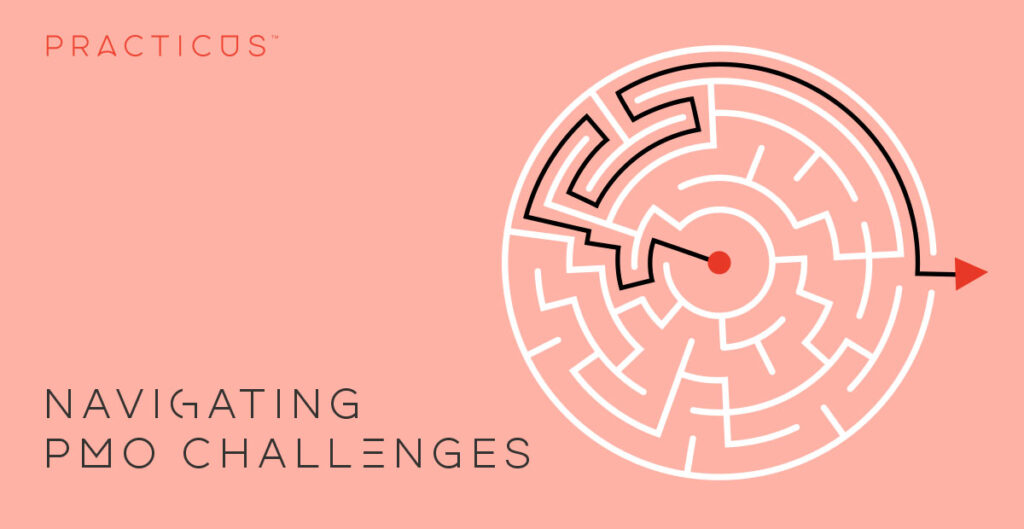Navigating PMO Challenges

Lloyd Kitchen, Senior Consultant, Independent Health & Social Care, Practicus
Project Management Offices (PMOs) play a critical role in organisations to ensure that projects are completed successfully, within budget, and on time. Indeed, for many healthcare providers and their suppliers, PMOs are vital in ensuring that projects stay on track efficiently, and effectively. PMOs help organisations manage projects by keeping everything in one place, applying best practice and avoiding wasting resources. They also make sure that risks are minimised and projects fit with the organisation’s goals.
However, in spite of the positives, it is not uncommon for PMOs to face challenges that hinder their ability to perform optimally. In talking to many of our clients, we have encountered many common concerns. So, we’ve compiled a list of ten real-life objections offering you valuable insights into the hurdles PMOs must overcome and emphasising the need to tackle these issues head-on for a successful collaboration. Needless to say this is an area where Practicus can help.
Here are some challenges cited by the PMO executives (in their own words):
- Poor perception of PMO within the business (not adding value).
When a PMO is perceived as not adding value to the business, it can significantly undermine its ability to function effectively and gain the support and trust of stakeholders and executives. This negative perception doesn’t just limit the PMO’s effectiveness; it can also lead to poor project outcomes, misalignment with the organisation’s strategic goals, and the eventual dismantling of the PMO itself.
To turn this situation around, the PMO must assess how its objectives align with the organisation’s priorities and deliver tangible, measurable results. By effectively communicating these accomplishments and consistently showcasing the positive impact of the PMO, they can shift perceptions, regain stakeholder trust, and solidify their essential role within the organisation. - PMO seen as an administrative function.
When a PMO is viewed as merely an administrative function rather than a strategic partner, it can struggle to gain its recognition and support to drive its success. This can lead to resources being undermined and reduced influence in contributions to strategic decision-making.
To shift this perception, the PMO needs to use data to actively demonstrate its value in the context of strategic goals and how its work contributes to achieving those goals. - Don’t have senior leadership engagement into portfolio/PMO.
Senior leadership engagement is crucial for the success of the PMO. Without buy-in from senior leadership, the PMO may not receive the necessary resources, support, or recognition to be effective. PMOs should make an effort to engage senior leadership, communicate the value of their activities, and ensure this activity remains aligned with goals over time, particularly with project portfolio management. - Don’t have PM engagement in PMO.
Project managers play a critical role in the success of the PMO. They are the ones who are responsible for delivering the projects that the PMO oversees. PMOs should work closely with project managers to ensure that their needs are met, and they have the necessary support to deliver successful projects. - Sponsors don’t understand their role to play as sponsors.
Sponsors are key stakeholders in projects and are responsible for providing support and resources to ensure that projects are successful. It’s essential that sponsors understand their role and are committed to supporting the project. PMOs should work with sponsors to ensure that they understand their role, and they are engaged in the project. - We have a lack of maturity in project management.
A lack of maturity in project management practices can lead to various issues, including ineffective planning, poor resource allocation, inadequate risk management, and inconsistent project delivery. This can result in projects not meeting their objectives, ultimately affecting the organisation’s bottom line and reputation. When executives raise concerns about the maturity of project management practices, they may be questioning the PMO’s ability to effectively support and improve these practices.
To address these concerns the PMO can assess the current state, then create a customised improvement plan, with an emphasis on open communication with stakeholders. By sharing the benefits of mature practices and keeping everyone informed, the PMO can help ease worries and get everyone on board with a more collaborative and supportive environment. - We have multiple PMOs run in different ways.
Multiple PMOs running in different ways can lead to confusion and inconsistencies in project management practices. One PMO might have a particular process for risk management, while another has a different approach. Such inconsistencies in how risks are identified, assessed, and mitigated across projects, can make it difficult to ensure that the organisation is managing risks effectively.
PMOs should work together to standardise project management practices and ensure that they are aligned with strategic objectives. - Have multiple PMO’s run in different ways.
Governance is essential for ensuring that projects are aligned with the organisation’s strategic objectives and are delivered successfully. PMOs should work with the organisation’s governance team to ensure that the governance framework is set up correctly and supports the organisation’s strategic objectives.
Projects may become misaligned with the organisation’s goals without a proper governance structure, leading to wasted resources and ineffective project outcomes. - Need to constantly prove our worth.
PMOs often face the challenge of proving their worth to the organisation as priorities shift and business needs evolve. It’s not uncommon for PMOs to feel like they’re under constant scrutiny, needing to justify their existence and contributions to the organisation’s success.
To change this perception, PMOs should establish and track metrics and KPIs that demonstrate their value, and communicate their successes in a relatable and engaging manner. By consistently showcasing their positive impact and keeping everyone informed, PMOs can build credibility and foster a supportive environment where they’re recognised as essential partners in the organisation’s journey. - The data feeding PMO is not fully trusted.
When the data feeding the PMO isn’t fully trusted, it can create doubts about the reliability of project insights and decision-making. Stakeholders may question the value of the PMO’s work if they believe the data being used is inaccurate or outdated.
To address this issue, PMOs should focus on establishing and maintaining data integrity by implementing proper data governance, conducting data quality checks, and validating data sources. By ensuring that the data is accurate, reliable, and current, PMOs can build trust and confidence in their work, ultimately leading to better project outcomes and stronger support from stakeholders.
PMOs don’t have to fail; they can be successful with the right systems, governance, and approach. By understanding and addressing these common objections, PMOs can proactively implement best practices, develop strong stakeholder relationships and align their efforts with the organisation’s goals.
However, when PMOs are struggling or failing, external short-term expertise can provide valuable insights and guidance to help them get back on track. With the right support and commitment, PMOs can overcome these challenges and play a vital role in driving success.
Finally, Practicus has built up a fantastic Advisory community, including numerous PMO experts who can provide free, impartial advice for your challenges. With their experience successfully tackling similar issues, their hindsight becomes your foresight, guiding you towards success, and it really is a free service.



